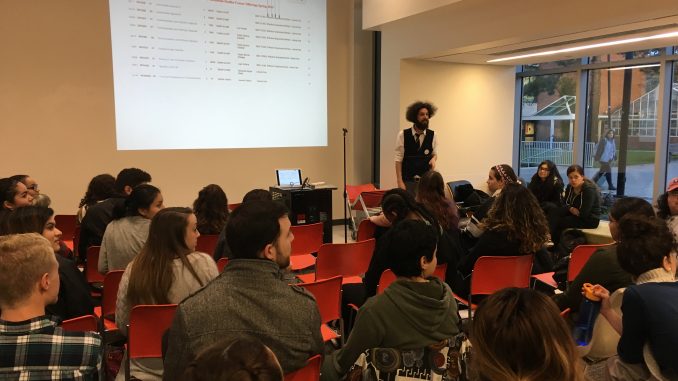
Despite not having its own department, the Latin American and Caribbean Studies program (LACS) has been actively present on campus. The program sponsors events such as movie screenings, art installations and cultural programs to achieve their main goal of spreading awareness and gaining exposure.
To gain further traction than previous years, the director of LACS, Cesar Barros, held the program’s annual fall reception in the Sojourner Truth Library on Oct. 24. The annual event gathers majors, minors, faculty and the general student body to talk about the program’s new initiatives, express needs, concerns and hopes.
In previous years, the problem lied in the reception’s visibility on campus. Despite sponsoring numerous events and programs, actual recognition of the program remains slim, and few students are enrolled. Using the library instead of a room in the Student Union Building provided the chance for the LACS to recruit more students.
“LACS has been around for a long time in our university and many students, faculty and staff know about it, but there are many who don’t or that don’t have a clear idea of who we are and what we do,” Barros said. “The reception is a relaxed, welcoming space for them to understand the program.”
Besides having an office space for its director, LACS has no general physical space. Having a reception once a year brings together all those involved, making it a special event for students to learn about the program’s new classes, study abroad opportunities and assess general inquiries such as what courses they hope to see in the interdisciplinary program.
The reception addressed those concerns and it was revealed that many history and sociology courses will be cross listed with LACS, as well as an addition of new courses such as “Feminist Perspectives on Decolonization” and “Spanish in the U.S.” Currently enrolled students also voiced their interest in having Chicano(a) studies as well as Afro-Latinidad (Latinx of African descent).
“It is important to see the Americas as a dynamic region in which populations, cultures, languages and power dynamics are in constant flux,” Barros said. “This approach to Latin America and the Caribbean, then, demands to focus also on migration, diasporas and the Latinx experience in the US.”
Latinx is a gender-neutral, all inclusive alternative to Latino or Latina, where “o” marks masculine and “a” marks feminine. The “x” neutrializes the gender power dynamic and ecompasses people who are trans, queer, agender, non-binary, gender non-conforming or gender fluid.
“So by including this word, the Latin American & Caribbean Studies Program wants to further develop its mission of inclusivity, transdisciplinarity and of fostering alliances and understanding between different populations and struggles,” Barros said.
With a 20 percent Latinx student body, the addition of Latinx studies would cater to the identities of many of the students and could foster the growth of a program that has given students the chance to explore their own cultures. This sentiment was explained by SUNY New Paltz alumnus Luis Lopez, who attended the fall reception to talk to students about how the program has given him the opportunity to study abroad and learn about a region that is so often ignored.
“With the courses offered through LACS, students will have the opportunity to learn nuestra historia (our history), not European colonization of Indigenous land and African enslavement,” Lopez said. “I believe it’s important to know where you come from and to know you don’t come from conquered land, but instead from resistance.”
During his time at SUNY New Paltz, Lopez studied abroad in Mexico, with Chicago’s Solidarity Network. Through this experience Lopez “learned how valuable a quality education is and what sacrifices human beings will make to educate themselves and those around them.”
With this experience, Lopez decided to pursue education as a career path. After leaving New Paltz, Lopez pursued a graduate degree at Columbia University. Today, he is a student advisor and counselor for students at Steinhardt School of Culture, Education and Human Development at New York University.
“We are a small program with limited resources, but we have always excelled at contributing to a culture of diversity and critical thinking on campus,” Barros said. “My mission is to keep developing this spirit and to find ways to facilitate professors’ and students’ initiatives that contribute to it.”
